https://consortiumnews.com/2016/12/15/making-russia-the-enemy/
By Robert Parry
The rising hysteria about Russia is best understood as fulfilling two needs for Official Washington: the Military Industrial Complex’s transitioning from the “war on terror” to a more lucrative “new cold war” – and blunting the threat that a President Trump poses to the neoconservative/liberal-interventionist foreign-policy establishment.
By hyping the Russian “threat,” the neocons and their liberal-hawk sidekicks, who include much of the mainstream U.S. news media, can guarantee bigger military budgets from Congress. The hype also sets in motion a blocking maneuver to impinge on any significant change in direction for U.S. foreign policy under Trump.
Some Democrats even hope to stop Trump from ascending to the White House by having the Central Intelligence Agency, in effect, lobby the electors in the Electoral College with scary tales about Russia trying to fix the election for Trump.
The electors meet on Dec. 19 when they will formally cast their votes, supposedly reflecting the judgments of each state’s voters, but conceivably individual electors could switch their ballots from Trump to Hillary Clinton or someone else.
On Thursday, liberal columnist E.J. Dionne Jr. joined the call for electors to flip, writing: “The question is whether Trump, Vladimir Putin and, perhaps, Clinton’s popular-vote advantage give you sufficient reason to blow up the system.”
That Democrats would want the CIA, which is forbidden to operate domestically in part because of its historic role in influencing elections in other countries, to play a similar role in the United States shows how desperate the Democratic Party has become.
And, even though The New York Times and other big news outlets are reporting as flat fact that Russia hacked the Democratic email accounts and gave the information to WikiLeaks, former British Ambassador Craig Murray, a close associate of WikiLeaks founder Julian Assange, told the London Daily Mail that he personally received the email data from a “disgusted” Democrat.
Murray said he flew from London to Washington for a clandestine handoff from one of the email sources in September, receiving the package in a wooded area near American University.
“Neither of [the leaks, from the Democratic National Committee or Clinton campaign chairman John Podesta] came from the Russians,” Murray said, adding: “the source had legal access to the information. The documents came from inside leaks, not hacks.”
Murray said the insider felt “disgust at the corruption of the Clinton Foundation and the tilting of the primary election playing field against Bernie Sanders.” Murray added that his meeting was with an intermediary for the Democratic leaker, not the leaker directly.
If Murray’s story is true, it raises several alternative scenarios: that the U.S. intelligence community’s claims about a Russian hack are false; that Russians hacked the Democrats’ emails for their own intelligence gathering without giving the material to WikiLeaks; or that Murray was deceived about the identity of the original leaker.
But the uncertainty creates the possibility that the Democrats are using a dubious CIA assessment to reverse the outcome of an American presidential election, in effect, making the CIA party to a preemptive domestic “regime change.”
Delayed Autopsy
All of this maneuvering also is delaying the Democratic Party’s self-examination into why it lost so many white working-class voters in normally Democratic strongholds, such as Pennsylvania, Michigan and Wisconsin.
Rather than national party leaders taking the blame for pre-selecting a very flawed candidate and ignoring all the warning signs about the public’s resistance to this establishment choice, Democrats have pointed fingers at almost everyone else – from FBI Director James Comey for briefly reviving Clinton’s email investigation, to third-party candidates who siphoned off votes, to the archaic Electoral College which negates the fact that Clinton did win the national popular vote – and now to the Russians.
While there may be some validity to these various complaints, the excessive frenzy that has surrounded the still-unproven claims that the Russian government surreptitiously tilted the election in Trump’s favor creates an especially dangerous dynamic.
On one level, it has led Democrats to support Orwellian/ McCarthyistic concepts, such as establishing “black lists” for Internet sites that question Official Washington’s “conventional wisdom” and thus are deemed purveyors of “Russian propaganda” or “fake news.”
On another level, it cements the Democratic Party as America’s preeminent “war party,” favoring an escalating New Cold War with Russia by ratcheting up economic sanctions against Moscow, and even seeking military challenges to Russia in conflict zones such as Syria and Ukraine.
One of the most dangerous aspects of a prospective Hillary Clinton presidency was that she would have appointed neocons, such as Assistant Secretary of State for European Affairs Victoria Nuland and her husband, Project for the New American Century co-founder Robert Kagan, to high-level foreign policy positions.
Though that risk may have passed assuming Clinton’s Electoral College defeat on Monday, Democrats now are excitedly joining the bash-Russia movement, making it harder to envision how the party can transition back into its more recent role as the “peace party” (at least relative to the extremely hawkish Republicans).
Trading Places
The potential trading places of the two parties in that regard – with Trump favoring geopolitical détente and the Democrats beating the drums for more military confrontations – augurs poorly for the Democrats regaining their political footing anytime soon.
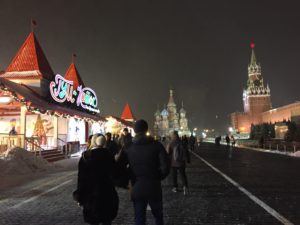
Red Square in Moscow with a winter festival to the left and the Kremlin to the right, on Dec. 6, 2016. (Photo by Robert Parry)
If Democratic leaders press ahead, in alliance with neoconservative Republicans, on demands for escalating the New Cold War with Russia, they could precipitate a party split between Democratic hawks and doves, a schism that likely would have occurred if Clinton had been elected but now may happen anyway, albeit without the benefit of the party holding the White House.
The first test of this emerging Democratic-neocon alliance may come over Trump’s choice for Secretary of State, Exxon-Mobil’s chief executive Rex Tillerson, who doesn’t exhibit the visceral hatred of Russian President Vladimir Putin that Democrats are encouraging.
As an international business executive, Tillerson appears to share Trump’s real-politik take on the world, the idea that doing business with rivals makes more sense than conspiring to force “regime change” after “regime change.”
Over the past several decades, the “regime change” approach has been embraced by both neocons and liberal interventionists and has been implemented by both Republican and Democratic administrations. Sometimes, it’s done through war and other times through “color revolutions” – always under the idealistic guise of “democracy promotion” or “protecting human rights.”
But the problem with this neo-imperialist strategy has been that it has failed miserably to improve the lives of the people living in the “regime-changed” countries. Instead, it has spread chaos across wide swaths of the globe and has now even destabilized Europe.
Yet, the solution, as envisioned by the neocons and their liberal-hawk understudies, is simply to force more “regime change” medicine down the throats of the world’s population. The new “great” idea is to destabilize nuclear-armed Russia by making its economy scream and by funding as many anti-Putin elements as possible to create the nucleus for a “color revolution” in Moscow.
To justify that risky scheme, there has been a broad expansion of anti-Russian propaganda now being funded with tens of millions of dollars in taxpayer money as well as being pushed by government officials giving off-the-record briefings to mainstream media outlets.
However, as with earlier “regime change” plans, the neocons and liberal hawks never think through the scenario to the end. They always assume that everything is going to work out fine and some well-dressed “opposition leader” who has been to their think-tank conferences will simply ascend to the top job.
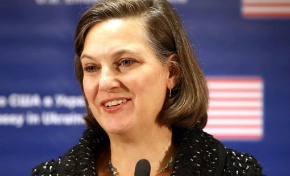
Assistant Secretary of State for European and Eurasian Affairs Victoria Nuland during a press conference at the U.S. Embassy in Kiev, Ukraine, on Feb. 7, 2014. (U.S. State Department photo)
Remember, in Iraq, it was going to be Ahmed Chalabi who was beloved in Official Washington but broadly rejected by the Iraqi people. In Libya, there has been a parade of U.S.-approved “unity” leaders who have failed to pull that country together.
In Ukraine, Nuland’s choice – Arseniy “Yats is the guy” Yatsenyuk – resigned amid broad public disapproval earlier this year after pushing through harsh cuts in social programs, even as the U.S.-backed regime officials in Kiev continued to plunder Ukraine’s treasury and misappropriate Western economic aid.
Nuclear-Armed Destabilization
But the notion of destabilizing nuclear-armed Russia is even more hare-brained than those other fiascos. The neocon/liberal-hawk assumption is that Russians – pushed to the brink of starvation by crippling Western sanctions – will overthrow Putin and install a new version of Boris Yeltsin who would then let U.S. financial advisers return with their neoliberal “shock therapy” of the 1990s and again exploit Russia’s vast resources.
Indeed, it was the Yeltsin era and its Western-beloved “shock therapy” that created the desperate conditions before the rise of Putin with his autocratic nationalism, which, for all its faults, has dramatically improved the lives of most Russians.
So, the more likely result from the neocon/liberal-hawk “regime change” plans for Moscow would be the emergence of someone even more nationalistic – and likely far less stable – than Putin, who is regarded even by his critics as cold and calculating.
The prospect of an extreme Russian nationalist getting his or her hands on the Kremlin’s nuclear codes should send chills up and down the spines of every American, indeed every human being on the planet. But it is the course that key national Democrats appear to be on with their increasingly hysterical comments about Russia.
The Democratic National Committee issued a statement on Wednesday accusing Trump of giving Russia “an early holiday gift that smells like a payoff. … It’s rather easy to connect the dots. Russia meddled in the U.S. election in order to benefit Trump and now he’s repaying Vladimir Putin by nominating Exxon Mobil CEO Rex Tillerson as secretary of state.”
Besides delaying a desperately needed autopsy on why Democrats did so badly in an election against the also-widely-disliked Donald Trump, the new blame-Russia gambit threatens to hurt the Democrats and their preferred policies in another way.
If Democrats vote in bloc against Tillerson or other Trump foreign-policy nominees – demanding that he appoint people acceptable to the neocons and the liberal hawks – Trump might well be pushed deeper into the arms of right-wing Republicans, giving them more on domestic issues to solidify their support on his foreign-policy goals.
That could end up redounding against the Democrats as they watch important social programs gutted in exchange for their own dubious Democratic alliance with the neocons.
Since the presidency of Bill Clinton, the Democrats have courted factions of the neocons, apparently thinking they are influential because they dominate many mainstream op-ed pages and Washington think tanks. In 1993, as a thank-you gift to the neocon editors of The New Republic for endorsing him, Clinton appointed neocon ideologue James Woolsey as head of the CIA, one of Clinton’s more disastrous personnel decisions.
But the truth appears to be that the neocons have much less influence across the U.S. electoral map than the Clintons think. Arguably, their pandering to a clique of Washington insiders who are viewed as warmongers by many peace-oriented Democrats may even represent a net negative when it comes to winning votes.
I’ve communicated with a number of traditional Democrats who didn’t vote for Hillary Clinton because they feared she would pursue a dangerous neocon foreign policy. Obviously, that’s not a scientific survey, but the anecdotal evidence suggests that Clinton’s neocon connections could have been another drag on her campaign.
Assessing Russia
I also undertook a limited personal test regarding whether Russia is the police state that U.S. propaganda depicts, a country yearning to break free from the harsh grip of Vladimir Putin (although he registers 80 or so percent approval in polls).
During my trip last week to Europe, which included stops in Brussels and Copenhagen, I decided to take a side trip to Moscow, which I had never visited before. What I encountered was an impressive, surprisingly (to me at least) Westernized city with plenty of American and European franchises, including the ubiquitous McDonald’s and Starbucks. (Russians serve the Starbucks gingerbread latte with a small ginger cookie.)
Though senior Russian officials proved unwilling to meet with me, an American reporter, at this time of tensions, Russia had little appearance of a harshly repressive society. In my years covering U.S. policies in El Salvador in the 1980s and Haiti in the 1990s, I have experienced what police states look and feel like, where death squads dump bodies in the streets. That was not what I sensed in Moscow, just a modern city with people bustling about their business under early December snowfalls.
The police presence in Red Square near the Kremlin was not even as heavy-handed as it is near the government buildings of Washington. Instead, there was a pre-Christmas festive air to the brightly lit Red Square, featuring a large skating rink surrounded by small stands selling hot chocolate, toys, warm clothing and other goods.
Granted, my time and contact with Russians were limited – since I don’t speak Russian and most of them don’t speak English – but I was struck by the contrast between the grim images created by Western media and the Russia that I saw.
It reminded me of how President Ronald Reagan depicted Sandinista-ruled Nicaragua as a “totalitarian dungeon” with a militarized state ready to march on Texas, but what I found when I traveled to Managua was a third-world country still recovering from an earthquake and with a weak security structure despite the Contra war that Reagan had unleashed against Nicaragua.
In other words, “perception management” remains the guiding principle of how the U.S. government deals with the American people, scaring us with exaggerated tales of foreign threats and then manipulating our fears and our misperceptions.
As dangerous as that can be when we’re talking about Nicaragua or Iraq or Libya, the risks are exponentially higher regarding Russia. If the American people are stampeded into a New Cold War based more on myths than reality, the minimal cost could be the trillions of dollars diverted from domestic needs into the Military Industrial Complex. The far-greater cost could be some miscalculation by either side that could end life on the planet.
So, as the Democrats chart their future, they need to decide if they want to leapfrog the Republicans as America’s “war party” or whether they want to pull back from the escalation of tensions with Russia and start addressing the pressing needs of the American people.
Investigative reporter Robert Parry broke many of the Iran-Contra stories for The Associated Press and Newsweek in the 1980s. You can buy his latest book, America’s Stolen Narrative, either in print here or as an e-book (from Amazon and barnesandnoble.com).

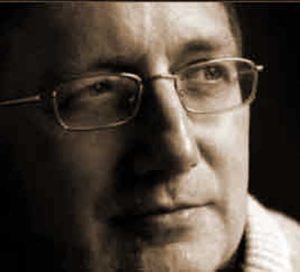
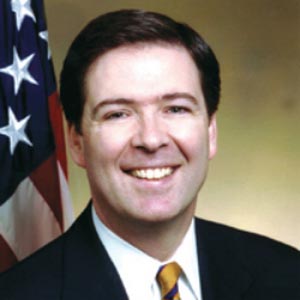

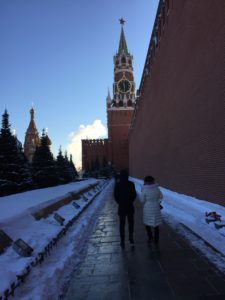


By Stuart Elden
https://progressivegeographies.files.wordpress.com/2012/03/reading-schmitt-geopolitically.pdf
She misjudged the voter and showed no sense of their concerns.
They were thinking about jobs and health and other concerns, her only policy was more war.
https://off-guardian.org/2016/06/16/deconstructing-russophobia/